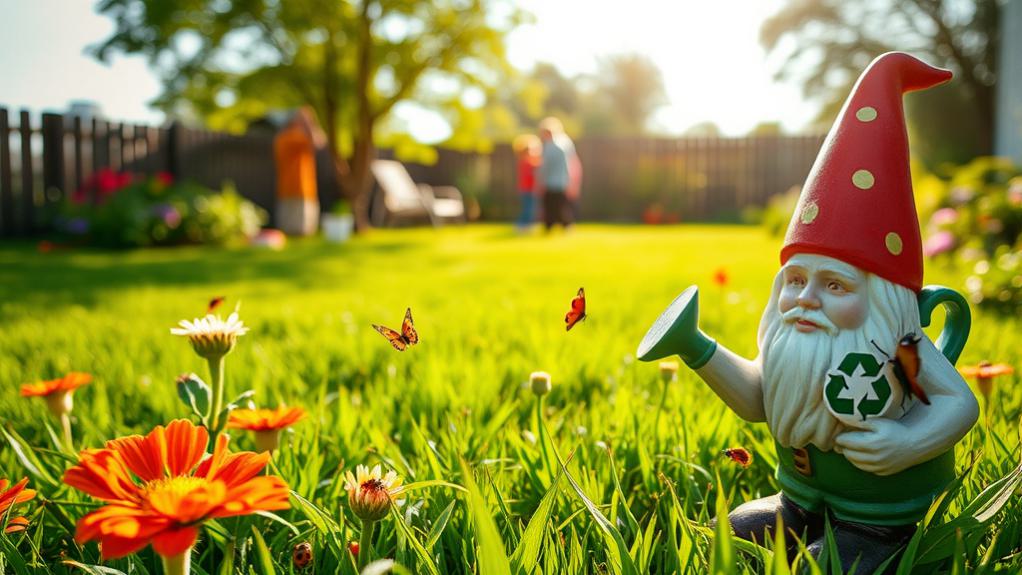Eco-friendly solutions for lawn pests offer numerous advantages by minimizing environmental impact and chemical exposure. Natural methods, like neem oil and diatomaceous earth, are effective in reducing pest populations while preserving beneficial insects and maintaining ecological balance. Integrated Pest Management (IPM) and companion planting optimize pest control by targeting specific pests efficiently. Additionally, organic solutions support lawn resilience and lower maintenance costs. More insights are available for those interested in inclusive eco-friendly approaches.
Table of Contents
Key Takeaways
- Eco-friendly pest control methods enhance sustainability and reduce reliance on harmful chemicals.
- Natural solutions preserve beneficial insects crucial for pollination and ecosystem balance.
- Integrated Pest Management combines strategies to target pests while minimizing chemical use.
- Organic products like neem oil decompose naturally, avoiding toxic residues on lawns.
- Eco-friendly options are safe for pets, reducing health risks associated with chemical pesticides.
Environmental Benefits of Natural Pest Control

The implementation of eco-friendly pest control methods offers a host of environmental benefits rooted in sustainability and efficiency. Eco-friendly solutions utilize natural pest control, greatly decreasing pest populations without chemical pesticides. Techniques like Integrated Pest Management allow for precise pest targeting while preserving beneficial insects essential for biodiversity. Additionally, organic pest control products, such as neem oil, naturally decompose, avoiding toxic residues. This promotes soil health, enhancing organic matter retention and reducing synthetic fertilizer dependency. Analytical studies highlight the role of these methods in fostering long-term ecological balance, enabling ecosystems to become more resilient against climate change challenges.
Safe and Effective Solutions for Homeowners

Exploring eco-friendly pest control options offers homeowners a viable path to managing lawn pests safely and effectively. By opting for natural solutions like neem oil and diatomaceous earth, individuals can guarantee safety for pets and beneficial insects while employing effective solutions.
Opt for natural pest control to safeguard pets and beneficial insects while maintaining effective solutions.
Benefits include:
- Reduced Health Risks: Organic solutions minimize exposure to chemicals linked to nerve issues prevalent in traditional pest control methods.
- Ecological Balance: Integrating sustainable practices preserves beneficial insects pivotal for pollination, contributing to a healthy environment.
- Cost Efficiency: Natural solutions foster resilient lawns, diminishing pest resurgence and reducing maintenance, proving economically sustainable long-term.
Such strategies exemplify maintaining ecological and family safety.
Combining Strategies for Optimal Results

Homeowners aiming to enhance their pest control efficacy can benefit from a multifaceted approach that combines various eco-friendly strategies. Employing neem oil with beneficial insects, such as ladybugs, optimizes pest deterrence while preserving garden ecosystems. Companion planting acts synergistically with eco-friendly pesticides, naturally repelling pests and sustaining plant vigor. Integrated Pest Management (IPM) employs regular monitoring, reducing reliance on singular methods and fostering effective pest control strategies. Additionally, organic treatments like diatomaceous earth regularly applied amplify their effects when coupled with preventive measures. These diverse strategies collectively offer robust eco-friendly solutions while maintaining ecological balance in lawn and garden environments.
Identifying and Targeting Specific Lawn Pests
Understanding how to effectively identify and target specific lawn pests is essential for maintaining a healthy garden ecosystem. Accurate pest control begins with identifying visible damage such as discoloration or wilting caused by insects like grubs and chinch bugs. These intruders can severely impact the environment by damaging roots or creating dead areas in grass.
- Monitor Life Cycles: Effective measures include observing pest life cycles, which supports timely and natural interventions.
- Utilize Monitoring Devices: Devices like traps assist in early detection, enabling eco-friendly, targeted treatment before substantial damage occurs.
- Maintain Records: Documenting pest activity and treatment effectiveness informs future strategies, enhancing long-term lawn health and sustainability.
Finding Reliable Organic Products and Services
With the foundation of effective pest identification and monitoring established, attention shifts to sourcing organic products and services that prioritize sustainability. Local garden centers offer a range of organic pest control products, providing homeowners ready access to eco-friendly solutions. For a more extensive selection, online retailers deliver specialized eco-friendly pest management options not found locally. Evaluating reliable organic pest control services involves seeking companies with demonstrated environmentally friendly practices. Community recommendations offer insights into service effectiveness and satisfaction. Consulting local experts guarantees tailored organic solutions, aligning pest control strategies with specific lawn and environmental needs, promoting sustainable alternatives.
Frequently Asked Questions
What Are the Benefits of Sustainable Pest Management?
Imagine a city adopting integrated pest management: reducing chemical exposure and enhancing soil health. Using organic alternatives supports beneficial insects and habitat preservation, promoting biodiversity. These long-term solutions offer cost-effectiveness and boost community awareness in sustainable practices.
What Does Eco-Friendly Mean in Pest Control?
Eco-friendly pest control encompasses natural pest management using organic alternatives, chemical-free methods, and plant repellents. It promotes habitat enhancement, respects pest life cycles, and utilizes insect predators, beneficial insects, companion planting, and cultural practices for sustainable pest reduction.
What Are the Advantages of Biodegradable Pesticides?
“An ounce of prevention is worth a pound of cure.” Biodegradable pesticides offer effectiveness and environmental safety, providing non-toxic alternatives that enhance soil health. They meet regulatory standards, ensuring long-term benefits and ecological balance, while increasing consumer awareness.
What Is the Most Environmentally Friendly Method for Controlling Pests?
The most environmentally friendly method for controlling pests involves integrated pest management, which utilizes pest monitoring, natural repellents, and chemical alternatives like neem oil. Enhanced habitat and plant diversity through companion planting and soil health improvement support beneficial insects in organic farming.